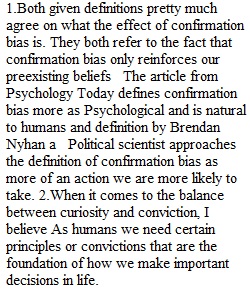


Q Confirmation Bias Be sure that you have interacted with all three resources posted on Blackboard and read the text section about “confirmation bias” before continuing. 1. Compare and contrast the various similar definitions of confirmation bias from the sources provided. What are the subtle differences or unique perspectives of the various definitions? What are the core ideas they have in common?2. The Psychology Today article suggests that one way to overcome confirmation bias is to “Approach life with curiosity, not conviction.” We will discover in the next chapter that this is likely a fallacy in thinking, because it creates a false “either/or” choice. In other words, we probably should approach life with both curiosity AND conviction (rather than one or the other). That being said, discuss how we should balance the role of conviction with the danger of confirmation bias. 3. Other solutions for overcoming confirmation bias are offered by the various sources. Reflect on your own life and discuss what advice is best for helping you navigate confirmation bias. If possible, give an example from your life that shows where confirmation bias is a challenge for you.
View Related Questions